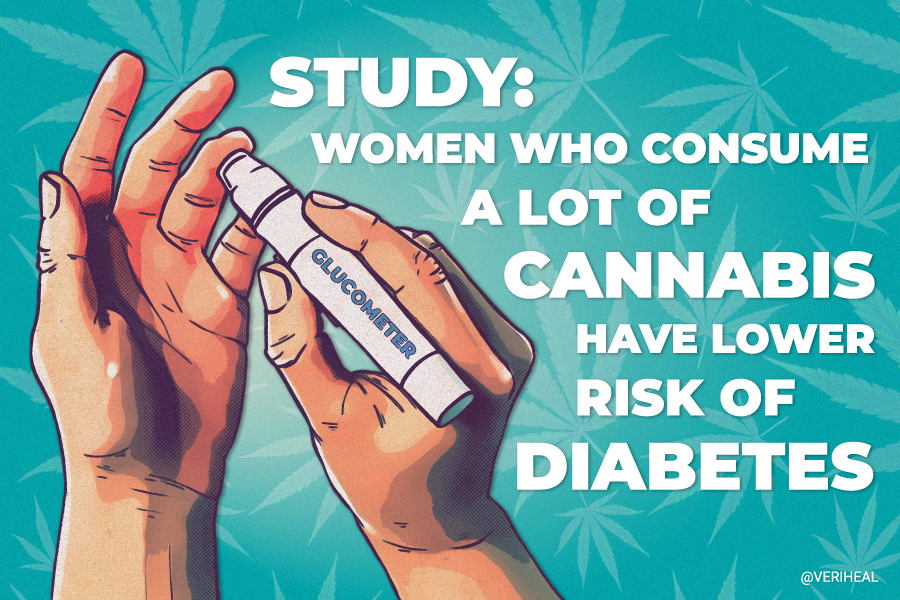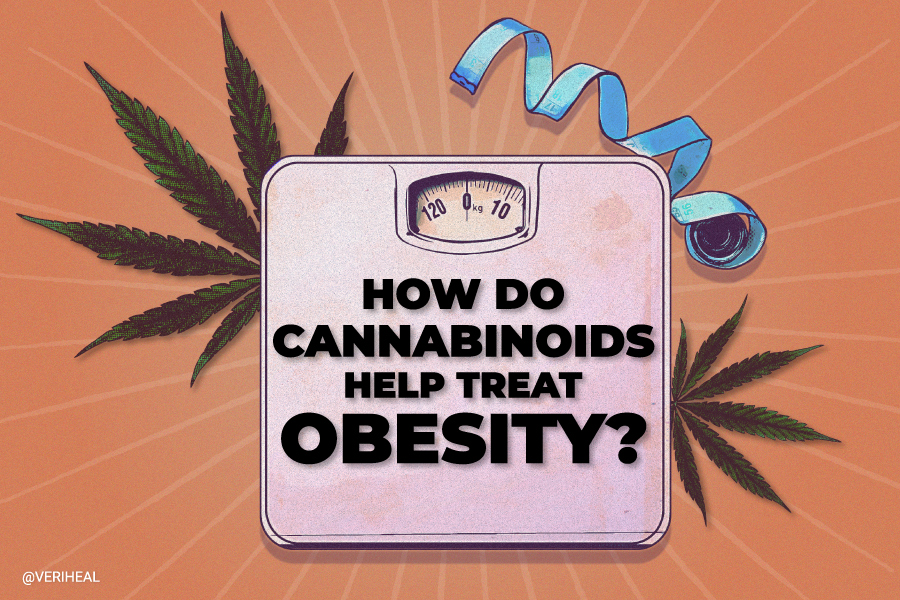Medical Cannabis Treatment for Patients with Diabetes

- Diabetes Signs, Symptoms and Types
- Diabetes Causes and Complications
- Diabetes Treatment: Can Cannabinoids Provide Relief
- The Role of the Endocannabinoid System in Treating Diabetes
- What Preparations of Cannabis are Best for Diabetes
- Talk to Your Doctor About These Types of Treatments
Diabetes mellitus—the seventh leading cause of death in the United States—is a group of diseases that affect how your body uses blood sugar (glucose) (6). Sadly for the 37.3 million U.S. residents who are diagnosed with this medical condition on an annual basis, the many complications of chronic, excess blood sugar are realities that they are forced to live with (3).
Glucose is one of the most essential substances in the human body. It serves as a primary source of fuel for cells that form muscles and tissues. More importantly, glucose provides energy for the brain. Although it is essential for human survival, excessive exposure to high glucose can be deadly and disabling. According to the CDC, diabetes is still the number 1 cause of kidney failure, lower-limb amputations, and adult blindness.
While 11.3% of the U.S. population lives with diabetes, 8.5 million people remain undiagnosed. Outside of the 28.7 million people who have been diagnosed with this debilitating disease, an additional 96 million people aged 18 and above are living with prediabetes (20). According to the CDC, that’s more than 1 in 3 U.S. adults with prediabetes who are at high risk of developing diabetes mellitus. Of these, 8 out of 10 adults with prediabetes also don’t even know they have it (6). Could cannabis hold the key to unlocking better quality of life for diabetics? As more research is carried out into cannabis users and non-users who have diabetes, an increasing number of people are supplementing traditional treatments with the pungent green plant.
Diabetes Signs, Symptoms and Types
There are four main types of diabetes: Type 1, Type 2, Gestational diabetes, and prediabetes. Type 1 diabetes is an autoimmune, hereditary condition and usually shows up in early life and may have an environmental trigger. Type 2 diabetes has an even stronger genetic link, and tends to arise later in life with higher risks related to unhealthy diet and lifestyle choices. Lower-income populations are disproportionately affected by diabetes due to Western economic factors causing income-related inequalities (2). Gestational diabetes, on the other hand, occurs during pregnancy but may continue to impact their lives after delivery.
In cases whereby glucose tolerance is slightly impaired, but not enough to be considered Type 2, a doctor will diagnose prediabetes. This type of diabetes may be diagnosed after a patient returns lab tests with either an A1C over 5.7% and 6.4; a fasting blood sugar of 100 to 125 mg/dL; or 140 to 199 mg/dL in an oral glucose tolerance test (routinely done in pregnancy)(11).
Approximately 1.6 million adults aged 20+ are believed to be living with (and are using insulin to treat) Type 1 diabetes (5). The prevalence of Type 2 diabetes, on the other hand, is significantly higher. Of the 37 million Americans that have diabetes, an estimated 90-95% of them have Type 2 diabetes. Within a year of diagnosis, almost 11% of them will start using insulin.
Although diabetes can go undetected, there are a number of symptoms and side effects that may indicate a problem. They include the following:
- Blurred vision
- Darkened patches of skin
- Fatigue
- Frequent urination
- Intense thirst
- Increased hunger
- Irritability
- Numb or tingling feet
- Recurring infections
- Slow-healing cuts and wounds
- Unexplained weight loss
It is important to regularly visit your doctor and ophthalmologist to detect possible blood sugar lab abnormalities, among others, before symptoms like these develop.
Diabetes Causes and Complications
In order to properly understand diabetes, it’s important to first pay some thought to the process of normal glucose production inside the body. Two specific hormones help the body to regulate blood glucose levels – glucagon and insulin. Think of them like the “yin and yang” of blood sugar maintenance.
Glucose is produced by the liver and the food you eat; foods that contain carbohydrates are transformed into glucose during the digestion phase. Once produced, glucose shifts through the bloodstream to power the body’s many functions.
Consequently, the pancreas receives a signal to produce insulin. This unique hormone instructs cells in the body to absorb glucose from the bloodstream. Once the glucose makes its way into your cells, blood glucose levels begin to drop.
Excess glucose, which is used as a source of fuel between meals, is stored by cells in the muscles and liver in the form of glycogen. When glucose levels nosedive, stored glycogen is broken down by the liver to maintain glucose levels.
Type 1 Diabetes
Doctors and scientists remain uncertain as to the exact cause of Type 1 diabetes. What they do understand, however, is that the chronic disease usually transpires in patients whose immune systems are inappropriately aimed at some of their own pancreas cells. Environmental factors, genetics, and viruses may contribute to Type 1 diabetes.
A network of biological processes known as the immune system tends to malfunction in diabetes patients. Instead of warding off bacteria, germs, and viruses, the immune system obliterates the all-important beta cells.
Found inside the pancreas, beta cells secrete insulin to promote glucose uptake into glucose recipient organs (7). As a direct effect of this, the body is left with minimal or no insulin. Rather than being carried to the beta cells, sugar accumulates in the bloodstream.
Prediabetes and Type 2 Diabetes
Formerly known as “adult-onset diabetes”, Type 2 diabetes is the most common type of diabetes. Unlike Type 1 diabetes, Type 2 occurs when the body develops a resistance to insulin and over time may fail to produce enough insulin.
If a doctor determines that your blood sugar levels aren’t high enough to be considered Type 2 diabetes, he/she will likely diagnose you with prediabetes. According to an ADA expert panel, 70% of prediabetes cases will progress to Type 2 diabetes (21).
Although environmental factors and genetics contribute to Type 2 diabetes, weight gain and lack of physical activity are also primary causes. Eating healthy, exercising, and avoiding smoking are also important steps to take to prevent diabetes.
Gestational Diabetes
Pregnancy-induced diabetes is known as “gestational diabetes” and it is normally diagnosed in the 24th to 28th week of pregnancy (22). If you don’t seek medical attention for gestational diabetes, there’s a high risk that you will develop preeclampsia, subsequent diabetes after pregnancy, and need a C-section for delivery. These are complications that should all be avoided.
Gestational diabetes may harm you and your unborn baby, so it is important to have regular prenatal appointments and don’t hesitate to contact your doctor if you suspect that you or someone you know may be at risk from this type of diabetes.
Diabetes Treatment: Can Cannabinoids Provide Relief?
Amid the recent rise of cannabis research—the Drug Enforcement Administration (DEA) recently began allowing growers to cultivate cannabis for investigative research purposes—the hype surrounding the effects of marijuana and diabetes is understandably heating up.
A large 2022 data analysis study from the Texas A&M School of Public Health examined national survey results from over 15,000 survey participants (13). They found that female cannabis consumers who consumed “heavy” amounts of cannabis had a lower incidence of diabetes than female “light” or non-consumers. Published in the journal Cannabis and Cannabinoid Research, the study also found that cannabis use in male adults, irrespective of the degree of exposure, was not significantly associated with diabetes mellitus in male adults. Further study is needed to explain these possible sex-based and dose-dependent differences as well as the underlying mechanisms.
Based on the results of a 2016 randomized controlled trial featured in Diabetes Care, “THCv (Tetrahydrocannabivarin) could represent a new therapeutic agent in glycemic control in subjects with type 2 diabetes (10).” In this study, twice daily doses of 100mg cannabidiol (CBD), 5mg THCV, 1:1 CBD:THCV, and 20:1 ratios of both were compared to placebo in 62 patients with type-2 diabetes, not on insulin, and with A1C <10%. The study authors also noted that the use of THCV alone has a significant impact on fasting blood glucose levels.
Additionally, THCV also improved pancreatic β-cell function and improved the 3-h blood glucose response to an oral glucose test. Interestingly, it was through a mechanism likely related to insulin signaling. It also increased the protein Apo A, which is important for building good cholesterol, and adiponectin concentrations. Adiponectin enhances liver insulin sensitivity, increases fatty acid oxidation, and has important anti-atherogenic properties.
The authors also noted that in mice, “THCV decreases appetite, increases satiety, and up-regulates energy metabolism, making it a clinically useful remedy for weight loss and management of obesity and type 2 diabetic patients.”
Researchers also found that CBD effectively lowered resistin levels and increased gastric inhibitory polypeptide, which triggers insulin production. THCV and CBD in combination, however, didn’t have any significant results so the two could possibly counter each other.
Still, since CBD possesses natural anti-inflammatory properties, this cannabinoid may serve as a vital tool for diabetes patients (4). A recent 2022 review concurs, stating that “the effects of CBD on diabetes may be ascribed from its suppression of IFN-γ and TNF-α production and inhibition of T-cell proliferation (14).” These are anti-inflammatory effects that may be protective in diabetes.
Similarly, a 2013 study of almost 5000 adults found that marijuana use was associated with lower levels of fasting insulin, insulin resistance, and smaller waist circumference (16).
The Role of the Endocannabinoid System in Treating Diabetes
The use of marijuana acts through the direct and indirect stimulation of cannabinoid receptors in the endocannabinoid system (ECS) – a biological cell-signaling system that modulates the central nervous system’s function and helps to maintain homeostasis.
Endocannabinoids regulate food consumption, redox-inflammatory changes, glucose homeostasis, and insulin release (9). Based on the results of preclinical studies, the ECS also “influences diabetes-induced oxidative stress, inflammation, fibrosis, and subsequent tissue injury in target organs for diabetic complications.”
Scientific evidence purports that an overactive ECS may contribute to the onset of diabetes by boosting energy intake and storage. Additionally, when the ECS goes into overdrive, glucose and lipid metabolism is diminished through the exertion of pro-apoptotic effects in pancreatic beta cells, as well as by promoting inflammation in pancreatic islets.
However, this study notes these negative effects are attributable to CB1 receptor activation. Delta-9 tetrahydrocannabinol (THC) is known to stimulate or overstimulate CB1 directly, increase food intake, and worsen fat metabolism (12). Meanwhile, CBD and THCV do not, and instead can modulate CB1, and inflammation, and thus cause healthy improvements in sugars and cell responses. (1, 14)
What Preparations of Cannabis are Best for Diabetes?
Among diabetes patients of all ages, capsules, edibles, smokable cannabis, vapes, and tinctures tend to be the most popular preparations. However, there are advantages and disadvantages to each method.
Diabetes patients who want fast symptomatic relief of neuropathy may inhale, best as dry-herb vaporizing, cannabis flower. However, limited data shows that the act of smoking cannabis (as with smoking anything) may be associated with free radical inflammation, peripheral and cardiovascular disease, renal disease, angina, and the risk of triggering a heart attack (8, 17, 18, 19). Since we know diabetics are already at higher risk of cardiovascular disease, they should be advised against smoking (combusting) cannabis until these cardiovascular risks are better understood.
Whereas ingestible capsules and edibles are a better option among those who are airway and heart health-conscious, and don’t mind a delayed onset and longer-lasting effects. Tinctures, on the other hand, allow for controlled-dose titration and will get to action within 15 minutes with similar long-lasting effects. Topicals may also be applied directly to painful areas of diabetic neuropathy. These non-inhalational routes are likely best for diabetics to avoid further cardiopulmonary risks.
In cases of diabetes, it may be worth seeking out a cannabis product that is rich in THCv and/or CBD. Conversely, cannabis that is rich in the psychoactive compound THC (tetrahydrocannabinol), may negatively impact people with diabetes, as summarized in this rapid review (17). Additionally, terpenes like beta-caryophyllene, geraniol, and pinene have demonstrated some anti-diabetic effects of their own. So, it may be more beneficial to focus on cannabinoid and terpene content versus whether a cannabis chemovar or “strain” is an indica or sativa.
Plus, since THC can stimulate a case of the “munchies”, it may not be best to go down this route. Why? Because overindulging in sugary snacks could further increase your blood sugar levels, weight, and inflammation!
Talk to Your Doctor About These Types of Treatments
Even if you don’t notice any signs or symptoms of diabetes, it’s important that you visit a doctor for regular yearly checkups. The earlier the condition is diagnosed, the faster you can begin treatment. It’s especially important to schedule a consultation or a physical examination with your doctor or healthcare practitioner if you have a family history of diabetes.
Following a diabetes diagnosis, you will be required to attend medical follow-up and educational appointments with healthcare professionals. You will also need regular foot, blood lab, and eye exams to observe for other complications. When discussing diabetes management treatment options with your doctor, it’s imperative that you talk openly and honestly about any medication you might already be taking and be sure to take your diabetes medications as directed.
Complementary Treatments Worth Discussing with Your Doctor
Don’t put all of your eggs in one basket when it comes to treating diabetes. By merging complementary treatments, you can better manage your blood pressure. Getting regular health checkups is the best place to start, as well as seeking out diabetes self-management education/support.
Listed below are some more suggested complementary treatments for diabetes:
- Acupuncture
- Aromatherapy
- Ayurvedic Medicine
- Chinese/Herbal Medicine
- Dietary Supplements
- Guided Imagery
- Homeopathy
- Physical Activity
- Relaxation Therapy
- Reflexology
- Massage Therapy
- Yoga
If you’re interested in trying medical cannabis to relieve the symptoms of diabetes, why not consult with a doctor to obtain a recommendation? Veriheal’s trained staff can assist you in finding the best treatment option from a broad network of licensed doctors.
Once you gain approval for a medical marijuana recommendation, we will present you with the leading dispensaries. A personalized consultation with a cannabis coach can help guide you to the methods that work best for your wellness. Find out if you qualify by contacting us today.
1. Abioye, A., Ayodele, O., Marinkovic, A., Patidar, R., Akinwekomi, A., & Sanyaolu, A. (2020). Δ9-Tetrahydrocannabivarin (THCV): A commentary on potential therapeutic benefit for the management of obesity and diabetes. Journal of Cannabis Research, 2(1). https://jcannabisresearch.biomedcentral.com/articles/10.1186/s42238-020-0016-7
2. American Diabetes Association. (2021, June 28). Income-related inequalities in diabetes have widened over past decade, CDC study finds. Income-Related Inequalities in Diabetes Have Widened Over Past Decade, CDC Study Finds | ADA. Retrieved August 15, 2022, from https://diabetes.org/newsroom/press-releases/2021/income-related-inequalities-in-diabetes-have-widened-over-past-decade-cdc-study-finds
3. American Diabetes Association. (2022). Statistics about diabetes. Statistics About Diabetes | ADA. Retrieved August 15, 2022, from https://diabetes.org/about-us/statistics/about-diabetes#:~:text=Prevalence%3A%20In%202019%2C%2037.3%20million,of%20the%20population%2C%20had%20diabetes.&text=Diagnosed%20and%20undiagnosed%3A%20Of%20the,and%208.5%20million%20were%20undiagnosed
4. Atalay, S., Jarocka-Karpowicz, I., & Skrzydlewska, E. (2019). Antioxidative and anti-inflammatory properties of Cannabidiol. Antioxidants, 9(1), 21. https://www.ncbi.nlm.nih.gov/pmc/articles/PMC7023045/
5. Centers for Disease Control and Prevention. (2021, December 29). Prevalence of diagnosed diabetes. Centers for Disease Control and Prevention. Retrieved August 15, 2022, from https://www.cdc.gov/diabetes/data/statistics-report/diagnosed-diabetes.html#:~:text=1.6%20million%20adults%20aged%2020,a%20year%20of%20their%20diagnosis
6. Centers for Disease Control and Prevention. (2022, July 7). What is diabetes? Centers for Disease Control and Prevention. Retrieved August 15, 2022, from https://www.cdc.gov/diabetes/basics/diabetes.html
7. Cerf, M. E. (2013). Beta cell dysfunction and insulin resistance. Frontiers in Endocrinology, 4. https://www.ncbi.nlm.nih.gov/pmc/articles/PMC3608918/
8. Chetty, K., Lavoie, A., & Dehghani, P. (2021). A literature review of cannabis and myocardial infarction—what clinicians may not be aware of. CJC Open, 3(1), 12–21.https://www.ncbi.nlm.nih.gov/pmc/articles/PMC7801213/
9. Gruden, G., Barutta, F., Kunos, G., & Pacher, P. (2015). Role of the endocannabinoid system in diabetes and diabetic complications. British Journal of Pharmacology, 173(7), 1116–1127.https://www.ncbi.nlm.nih.gov/pmc/articles/PMC4941127/
10. Jadoon, K. A., Ratcliffe, S. H., Barrett, D. A., Thomas, E. L., Stott, C., Bell, J. D., O’Sullivan, S. E., & Tan, G. D. (2016). Efficacy and safety of Cannabidiol and Tetrahydrocannabivarin on glycemic and lipid parameters in patients with type 2 diabetes: A randomized, double-blind, placebo-controlled, Parallel Group Pilot Study. Diabetes Care, 39(10), 1777–1786. https://pubmed.ncbi.nlm.nih.gov/27573936/
11. Mayo Foundation for Medical Education and Research. (2022, March 17). Prediabetes. Mayo Clinic. Retrieved August 15, 2022, from https://www.mayoclinic.org/diseases-conditions/prediabetes/diagnosis-treatment/drc-20355284
12. National Academies of Sciences, Engineering, and Medicine; Health and Medicine Division; Board on Population Health and Public Health Practice; Committee on the Health Effects of Marijuana: An Evidence Review and Research Agenda. The Health Effects of Cannabis and Cannabinoids: The Current State of Evidence and Recommendations for Research. Washington (DC): National Academies Press (US); 2017 Jan 12. 6, Cardiometabolic Risk. Available from: https://www.ncbi.nlm.nih.gov/books/NBK425743/
13. Ogunsola, A., Smith, S., Eniola, O., Mercy, U., & Karaye, I. (2022). Sex differences in the association between cannabis use and diabetes mellitus among U.S. adults: The National Health and Nutritional Examination Survey, 2013–2018. Cannabis and Cannabinoid Research. https://pubmed.ncbi.nlm.nih.gov/34981965/
14. Peng, J., Fan, M., An, C., Ni, F., Huang, W., & Luo, J. (2022). A narrative review of molecular mechanism and therapeutic effect of cannabidiol (CBD). Basic & Clinical Pharmacology & Toxicology, 130(4), 439–456. https://onlinelibrary.wiley.com/doi/10.1111/bcpt.13710
15. Peng, J., Fan, M., An, C., Ni, F., Huang, W., & Luo, J. (2022). A narrative review of molecular mechanism and therapeutic effect of cannabidiol (CBD). Basic & Clinical Pharmacology & Toxicology, 130(4), 439–456. https://onlinelibrary.wiley.com/doi/full/10.1111/bcpt.13710
16. Penner, E. A., Buettner, H., & Mittleman, M. A. (2013). The impact of marijuana use on glucose, insulin, and insulin resistance among us adults. The American Journal of Medicine, 126(7), 583–589. https://pubmed.ncbi.nlm.nih.gov/23684393/
17. Porr, C. J., Rios, P., Bajaj, H. S., Egan, A. M., Huot, C., Batten, R., Bishop, L., Ryan, D., Davis, E., Darvesh, N., Rahman, A., Asghari, S., Acheampong, L., & Tricco, A. C. (2020). The effects of recreational cannabis use on glycemic outcomes and self-management behaviours in people with type 1 and type 2 diabetes: A rapid review. Systematic Reviews, 9(1). https://www.ncbi.nlm.nih.gov/pmc/articles/PMC7433109/
18. Skipina, T. M., Patel, N., Upadhya, B., & Soliman, E. Z. (2022). Cannabis use is associated with prevalent coronary artery disease. The American Journal of the Medical Sciences.https://pubmed.ncbi.nlm.nih.gov/35427587/
19. Skipina, T. M., Upadhya, B., & Soliman, E. Z. (2022). Cannabis use is associated with prevalent angina in individuals with diabetes. Cannabis and Cannabinoid Research. https://www.liebertpub.com/doi/10.1089/can.2021.0175
20. Statistics about diabetes. Statistics About Diabetes | ADA. (n.d.). Retrieved August 17, 2022, from https://diabetes.org/about-us/statistics/about-diabetes#:~:text=Prediabetes%3A%20In%202019%2C%2096%20million,18%20and%20older%20had%20prediabetes
21. Tabák, A. G., Herder, C., Rathmann, W., Brunner, E. J., & Kivimäki, M. (2012). Prediabetes: A high-risk state for diabetes development. The Lancet, 379(9833), 2279–2290. https://www.ncbi.nlm.nih.gov/pmc/articles/PMC3891203/
22. U.S. Department of Health and Human Services. (2017). Definition & Facts of gestational diabetes. National Institute of Diabetes and Digestive and Kidney Diseases. Retrieved August 17, 2022, from https://www.niddk.nih.gov/health-information/diabetes/overview/what-is-diabetes/gestational/definition-facts#:~:text=Gestational%20diabetes%20is%20a%20type,to%2028th%20week%20of%20pregnancy
















